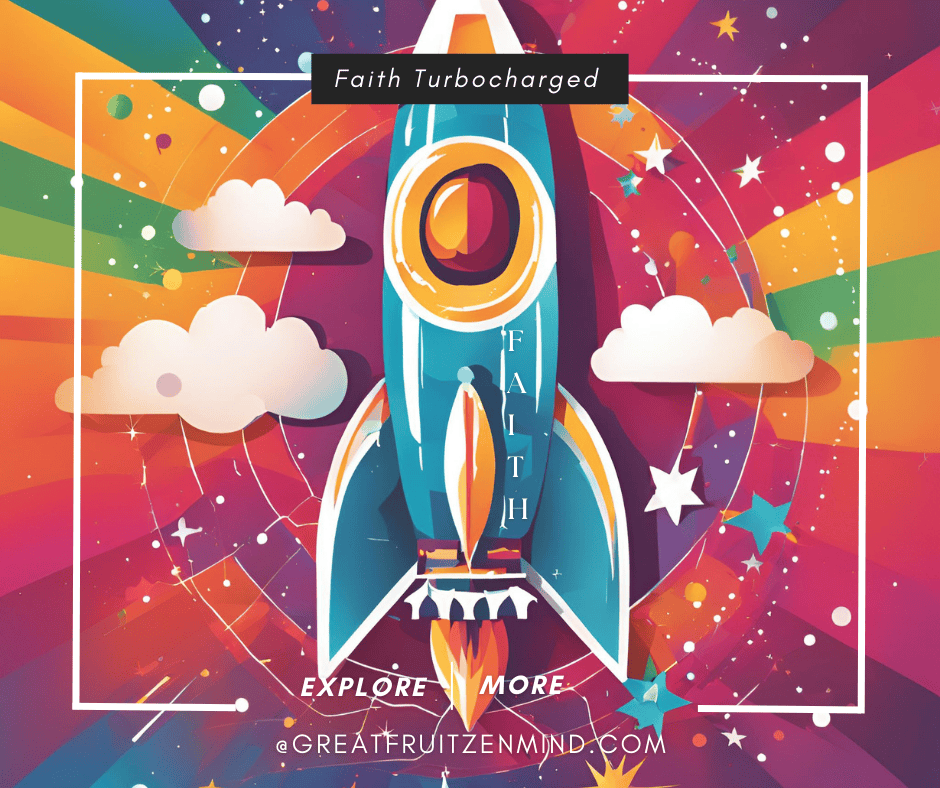In The Ineffectiveness of Willpower, I argued that committed practice—not willpower—is the most reliable path to transformation. Today I want to affirm that truth in a way that inspires us to live it. This is not about halfway measures. This is about Zen faith with the dial turned all the way up. Faith turbocharged.
What is the real value of faith?
Steve Jobs once said:
“You can’t connect the dots looking forward; you can only connect them looking backward. So you have to trust that the dots will somehow connect in your future.”
What unnerves us is the future—the blank page. We don’t know how it will unfold, and that uncertainty can feel overwhelming. I’m not going to tell you that everything happens for a reason, because, frankly, I don’t know that. That’s blind faith.
What I do know is this: correct understanding of the teachings leads to good practice. Good practice leads to transformation. Transformation gives us a new way of living. And when we look back, the dots connect. The evidence of faith’s value is in our lived experience, and that evidence encourages us to stay committed moving forward.
Discover the Value for Yourself
Mahatma Gandhi wrote:
“Faith must be enforced by reason. When faith becomes blind, it dies.”
The advanced lessons here can sometimes feel heavy. They aren’t designed to fit neatly into a swipe-right culture. But they are included for a reason. They resonate, they inspire, and—importantly—they validate faith with lived evidence.
As understanding deepens, so does trust. Understanding put into practice generates results, which reinforce faith, which in turn strengthens practice. This feedback loop is faith alive, faith turbocharged.
Faith against doubt
C.S. Lewis put it this way:
“Faith is the art of holding on to things your reason has once accepted, in spite of your changing moods.”
Practice, like life, moves in cycles—highs and lows, moments of clarity and moments of doubt. The ego will resist and argue with itself. During such times, faith provides a respite. Letting go of the restless mind and resting in trust brings comfort and relief.
Relentless trust
Anne Lamott reminds us:
“Hope begins in the dark, the stubborn hope that if you just show up and try to do the right thing, the dawn will come. You wait and watch and work: you don’t give up.”
Zen does not ask us to believe in a deity. It asks us to trust the practice. To trust the process. Lamott urges us to keep showing up, to be stubborn in our commitment. That is the practice: letting go again and again, even when the ego insists not this, not that, not now.
Here faith is not passive. It is stubborn, relentless, and committed.
Turn it up to 11
Norman Vincent Peale adds:
“Your faith is not a thermometer measuring the temperature of your fear or your doubt. Your faith is a thermostat, regulating and setting the temperature of your success. Activate your faith, live with confidence, and transform your life.”
That’s the heart of it. Faith is not reactive—it is generative. Strong faith fuels strong practice, which fuels transformation. So turn it up. Crank the amp to 11. Activate your faith, live with confidence, and transform your life.
That’s faith turbocharged. Did somebody say Absolute Freedom?
Explore more:
After I finish writing these lessons I usually do a quick online search to see if there is anything out there that will add something interesting or relevant to the conversation. This time my search uncovered an article from Chapel Hill Zen Center that I found so relevant and wonderfully crafted that I feel compelled to quote from it at length. It is entitled “Faith & Vow In Zen Practice,” by Josho Pat Phelan.
“The Zen precepts ceremony begins, ‘Invoking the presence and compassion of our ancestors, in faith that we are Buddha, we enter Buddha’s Way.’ Entering Buddha’s Way can be characterized by choosing, moment by moment, to live based on vow, on our deep intention to wake up, rather than living by default based on our karmic or habitual reactions and preferences.”
The teachings may inspire us, but the practice may transform us
“The meaning of faith in Buddhism is the conviction that grows through our own direct experience with the teaching. This doesn’t mean just hearing the teaching and liking it, or even understanding it – it means knowing how the teaching applies and works in our own lives. In Zen we tend to use the word faith to mean trust, or the confidence that practice works – that the fundamental nature of our mind is awakened; and because of this, we can throw ourselves fully into practice without expectations. Practice then becomes an endeavor that isn’t dependent on what it can do for us. We, ourselves, have the ability to practice and to awaken, so our trust or faith is not in something outside ourselves; or, maybe it means trusting everything, including ourselves and our practice.”
Have faith, even when you lack faith
“Katagiri Roshi said, ‘Right faith is not waiting until we understand something and then doing it; faith is to do something even though our consciousness tells us we don’t have faith, even though we don’t know what right faith is. Right faith is to do something because it is exactly the total manifestation of the ultimate nature of existence.’ He said, ‘We have to get out of this small well …. even if it is only once…’”
–
Greatfruit Zen Mind is committed to remaining independent and ad-free. Thank you for your support. Join The Undercurrent. Stay connected. See you next time.
🌀 From the GZM Archives – Polished, Preserved, Still Relevant..


Leave a Reply